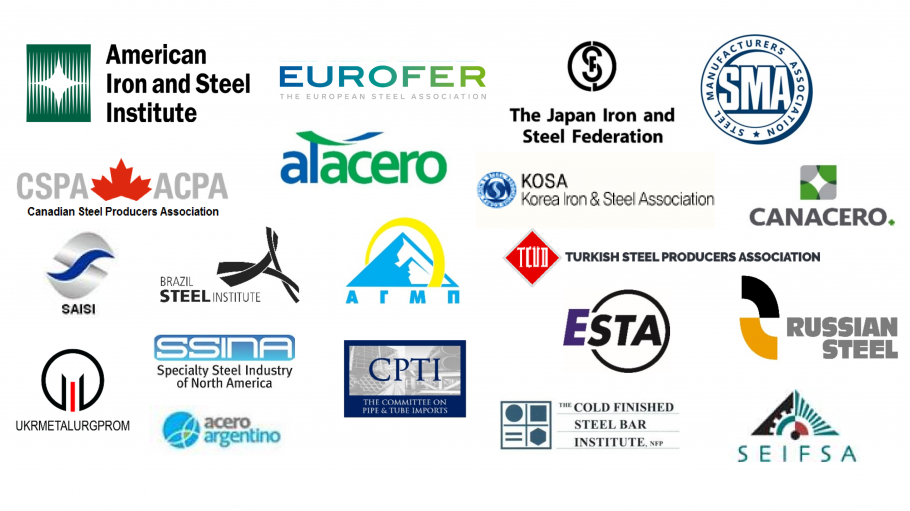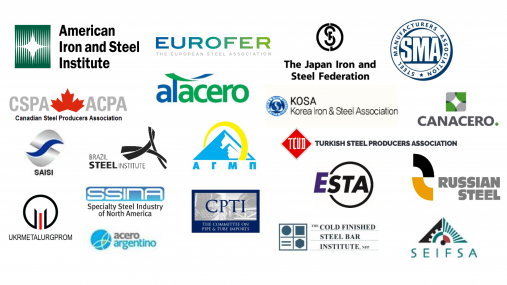
Press releases » Global steel groups urge the Global Forum on Steel Excess Capacity to expand efforts to address growing steel crisis
Global steel groups urge the Global Forum on Steel Excess Capacity to expand efforts to address growing steel crisis
Downloads and links
Recent updates

Worldwide, October 22, 2020 - Steel industry associations in the Americas, Europe, Asia and Africa today renewed their call for governments of steel-producing economies to intensify their work in the Global Forum on Steel Excess Capacity (GFSEC).
Steel industries throughout the world expressed tremendous concern about the recent increase in steel overcapacity at a time when steel demand is severely depressed by the COVID-19 pandemic, reversing a trend of gradual decreases in overcapacity in the three years after the GFSEC was established (2016 - 2019).
The associations noted the uneven state of recovery in macro-economic conditions and steel production across the world and are particularly concerned about a risk of potential destabilisation of international steel markets.
Steel industries commend the commitments taken by the members of the steel forum to create transparency in regional market and capacity evolutions and review capacity increases based on the agreed policy principles and recommendations set out in the Berlin Ministerial report.
However, the scale and persistence of excess capacity in the steel industry calls for more ambition in the transparency and policy-related work of the GFSEC.
The steel associations specifically call on participating governments of the forum to:
The steel associations also call on non-participating governments to resume active participation in the GFSEC’s work. Effectively addressing the global steel crisis is in the interest of all economies, steel producers, and steel consumers worldwide, and requires the active engagement of all G20 economies.
Contacts for more information around the world:
AISI – Lisa Harrison, lharrison@steel.org, 202.452.7115
EUROFER – Charles de Lusignan, charles@eurofer.eu, 0032 2738 79 35
CSPA – Catherine Cobden, c.cobden@canadiansteel.ca, 613.238.6049
CANACERO – Salvador Quesada, squesada@canacero.mx, 52 (55) 5448-8162
SMA – Annie Stefanec, stefanec@steelnet.org, 202.296.1515
Alacero – Fernanda Valente, fevalente@alacero.org, (55 11) 3195-5803
Brazil Steel Institute – Débora Oliveira, debora.oliveira@acobrasil.org.br, 55 (21) 3445-6327 | 6300
JISF – Shigeru Hagiuda, hagiuda@jisf.or.jp, 81 3 3669 4835
Russian Steel – Alexey Sentyurin, senturin@russtal.ru 79 153226225
Turkish Steel Producers Association – Veysel Yayan, veyselyayan@celik.org.tr, 90 3124663734
ESTA – François Michalet, francois.michalet@esta-tube.com, 33 1 41 31 56 43
AMME – Alisher Zholdybayev, zholdybayev@agmp.kz, 87029141261
SAISI – Charles Dednam, charles@saisi.org, 27 12 380 0900
KOSA – Taekyung Koh, taekyung.koh@ekosa.or.kr, 82 2-559-3546
Ukrmetalurgprom – Oleksandr Kalenkov, office@ukrmetprom.org, 38 (044) 279 05 25
SSINA – Larry Lasoff, LLasoff@kelleydrye.com, 202.342.8530
CPTI – Tamara Browne, tbrowne@schagrinassociates.com, 202.223.1700
CFSBI - Casey P. Bouton , cbouton@taubensee.com, 800-459-5101
SEIFSA – Michael Ade, michael.ade@seifsa.co.za, 011 298 9432
Acero Argentino - Carlos A. Vaccaro, c.vaccaro@acero.org.ar, (5411) 4311-6368 / 637

Strasbourg, 17 December 2025 – The European Commission’s latest proposals on the Carbon Border Adjustment Mechanism (CBAM), unveiled today, correctly identify several loopholes that risk undermining its effectiveness, notably regarding EU exports, downstream sectors and circumvention practices. However, despite these laudable efforts, the measures put forward fail to deliver a comprehensive and durable response to carbon and jobs leakage, warns the European Steel Association (EUROFER).
A milestone occasion to quickly and effectively restore affordable electricity, to relaunch the
decarbonization and strengthen the international competitiveness of the European steel
industry.
Brussels, 02 December 2025 – Unchanged negative conditions – U.S. tariffs and trade disruptions, economic and geopolitical tensions, protracted weak demand and still high energy prices – continue to weigh on the European steel market. EUROFER’s latest Economic and Steel Market Outlook confirms for 2025 another recession in both apparent steel consumption (-0.2%, unchanged) and steel-using sectors (-0.5%, revised from -0.7%). A potential recovery is expected only in 2026 for the Steel Weighted Industrial Production index (SWIP) (+1.8%, stable) and for apparent steel consumption (+3%, slightly revised from +3.1%) – although consumption volumes would still remain well below pre-pandemic levels. Steel imports retained historically high shares (27%), while exports plummeted (-9%) in the first eight months of 2025.